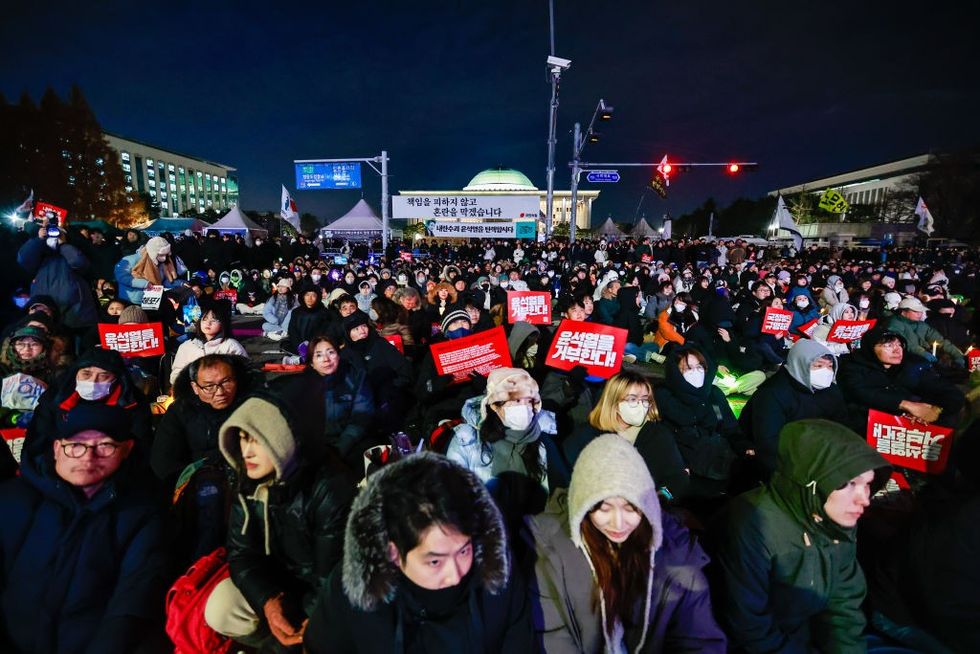South Koreans Must Keep Up Our Courage Against Anti-Democratic Forces
The movement continues to end Yoon Suk Yeol’s legacy of betrayal and dismantlement of Korea’s sovereignty.
For more than 44 hours Koreans have braved freezing snowstorms to demand the arrest of the elusive Yoon Suk Yeol, who has barricaded himself inside his official residence in defiance of constitutional and legal authority. Yoon, extolled by Washington as a “champion of democracy,” has vanished from public view behind hastily erected barricades manned by security and military personnel while ignoring repeated summons from both the anti-corruption and prosecution services.
Capping a monthlong standoff with the National Assembly and the Korean public over his brazen attempted coup, Washington’s “perfect partner” has spent the past week deploying the armed military and security services at his disposal to physically prevent police from serving him with an arrest warrant for insurrectionism and abuse of authority. Investigators from the Corruption Investigation Office attempting to execute the warrant—the first against a sitting president—were forced to withdraw from the presidential compound after a five-hour standoff with the over 200 armed men deployed by Yoon.
This unprecedented drama began unfolding on the night of December 3, 2024. Amid over 250 days of intentionally destabilizing U.S.-led war games and months of massive citizen protests demanding his resignation, the deeply unpopular president put his nation under martial law for the first time since 1979, dispatching armed troops with the orders to “shoot to kill” if necessary to surround the National Assembly and prevent lawmakers from convening to rescind the order.
How can the world support Korea’s quest for democracy, peace, and true sovereignty?
By the following night, some 2 million Koreans bearing light sticks, candles, and beacons formed a luminous sea around the National Assembly to demand the impeachment of Yoon Suk Yeol, while lawmakers clambered over fences and security barriers to gain access to the chambers. With a vote of 204 to 85, which included 12 lawmakers from the ruling People’s Power Party (PPP), the National Assembly impeached Yoon, with Democratic Party leader Lee Jae-myung declaring, “The people have proved that they are the owners of this country.”
While the Constitutional Court has 180 days to render a judgment on whether the impeachment motion is constitutional, Yoon’s rogue insurrectionism and contemptuous defiance of the rule of law is continuing, escalating tensions and instability.
Yoon’s motivation for his failed insurrection lies in the ongoing crisis of legitimacy facing his puppet government, which has eagerly acquiesced to every demand made by its American and Japanese “allies” while making a hollow mockery of Korean self-determination and ignoring the interests of the nation he swore to defend. Since assuming power in 2022 after winning the presidency by a razor-thin margin of 0.7%, Yoon has actively worked to undermine the very basis of Korean independence and democracy back to its roots during the brutal period of Japanese colonization in WWII.
Moreover, Washington’s unquenchable geopolitical ambitions, couched behind its so-called “ironclad commitment to Korea,” mandates the continuation of its policy of preferring right-wing governments at the expense of Korea’s sovereignty. This has overtly empowered and legitimized Yoon’s autocratic pursuit of power against the interests of the Korean people.
Thus, Yoon—who represented his country by sycophantically singing “American Pie” during a state dinner at the White House—has dutifully promoted the U.S.-led trilateral “Axis of War”, facilitating non-stop U.S.-led war games, and escalating tensions with Pyongyang while persecuting his domestic critics as “communists” and “anti-state forces.” His ongoing rogue behavior of defiance of the rule of law is directly related to the strong support he has received from Washington as “Biden’s man” in Seoul.
With the president suspended from power, what’s next for Korea’s “Revolution of Lights”? How can the world support Korea’s quest for democracy, peace, and true sovereignty? Demand accountability for Yoon’s legacy of authoritarianism, his continuing assault on democracy and the rule of law, and his betrayal of Korean sovereignty in service of Washington’s geopolitical ambitions. Call for a final end to Washington’s shameful history of subverting South Korean politics by abetting dangerous far-right forces that take Korea’s democracy and sovereignty hostage.


 (Photo: Daniel Ceng/Anadolu via Getty Images)
(Photo: Daniel Ceng/Anadolu via Getty Images) 